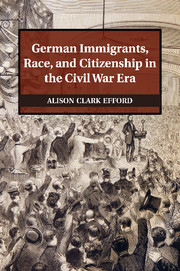‘A brilliant study in every respect, full of local texture, of importance for the whole story of a key period in US history, and of powerfully rendered transnational crosscurrents. Efford’s deep research establishes the dramatic connection of German Americans to freedom struggles in the 1850s and 1860s and to the retreat from such commitments in the waning of Reconstruction, convincingly connecting both with the changing history of the land that immigrants left.’
David Roediger - University of Illinois, and co-author of The Production of Difference (2012)
‘German Immigrants, Race, and Citizenship in the Civil War Era stands out in a growing literature on ethnicity, immigration, and the American Civil War by its attention, not only to the contributions of a discrete ethnic group to the great struggle over slavery, but also to the contentious process by which an immigrant group fractured along political and cultural lines constituted and reconstituted itself and the larger American polity.’
Andrew Zimmerman - George Washington University, Washington DC
'Enhances understanding of a critical period in US history and contributes to the growing scholarship on citizenship and the role of German immigrants in US history.'
Source: Choice
'The immigrant story, with its emphasis on citizenship and international comparison, leads us toward a new narrative of postwar politics that integrates race, ethnicity, gender and political economy.'
Stephen D. Engle
Source: Reviews in American History
'Alison Clark Efford provides an innovative examination of Germans' role in the defining and redefining of citizenship in the United States during the Civil War and Reconstruction. … a model of transnational history. … Efford reveals the strong sense of self-assurance [the] immigrants retained in the United States. This confidence is something all historians of American immigration should take as seriously as Efford has in her excellent book.'
David T. Gleeson
Source: American Historical Review
'An important new book on the literature of ethnicity in the nineteenth century, Alison Clark Efford's German Immigrants, Race, and Citizenship in the Civil War Era offers a well-researched, sharply written, and conceptually integrative approach to understanding how and why German American immigrants supported African American rights during the sectional period. … [An] urbane study that any serious student of nineteenth-century America should read.'
Christian B. Keller
Source: Journal of American History
'This is an innovative contribution to German-American studies that deserves highest praise.'
Cora Lee Kluge
Source: Max Kade Institute Friends Newsletter
'German Immigrants, Race, and Citizenship in the Civil War Era is imaginative and relentlessly rigorous in analysis and organization. Efford's prose seamlessly interweaves a diverse and rich cast of mid-nineteenth century German immigrants. Civil War buffs, German enthusiasts, and scholars alike must read this book.'
Luke Ritter
Source: Ohio Valley History
'Efford’s impressive study opens up new ways to understand the arc of radicalism that the refugees of the 1848 revolution generated.'
Frank Baron
Source: Amerikastudien/American Studies
'… German Immigrants, Race, and Citizenship in the Civil War Era impressively links the German American narrative, too often buried in German-language newspapers and its own subculture, with the larger American narrative of citizenship and nationalism during the Civil War and Reconstruction. Efford carves out an important path that should affect how ethnic historians tell the stories of immigrant groups in America.'
Paul Fessler
Source: Journal of American Ethnic History
'German Immigrants, Race, and Citizenship in the Civil War Era is a significant addition to this robust, yet still fruitful, body of literature. [It] is an exemplar book for anyone interested in investigating the contribution of immigrants to the construction of nineteenth-century United States.'
Lorenzo Costaguta
Source: 49th Parallel: An Interdisciplinary Journal of North American Studies
'Efford does an excellent job of thinking about ethnicity in connection with race and gender and shows how Old World ideology was used as a prism for New World politics. Moreover, Efford convincingly demonstrates that the Forty-Eighters and influential newspaper editors helped shape German immigrant communities’ political sensibilities and, by extension, exerted some influence on the Republican Party. Where many scholars of Civil War era ethnicity historically have taken a hagiographic and monolithic view of specific ethnic groups, Efford’s analysis is refreshingly nuanced and thus highly recommended.'
Anders Bo Rasmussen
Source: The Journal of the Civil War Era



